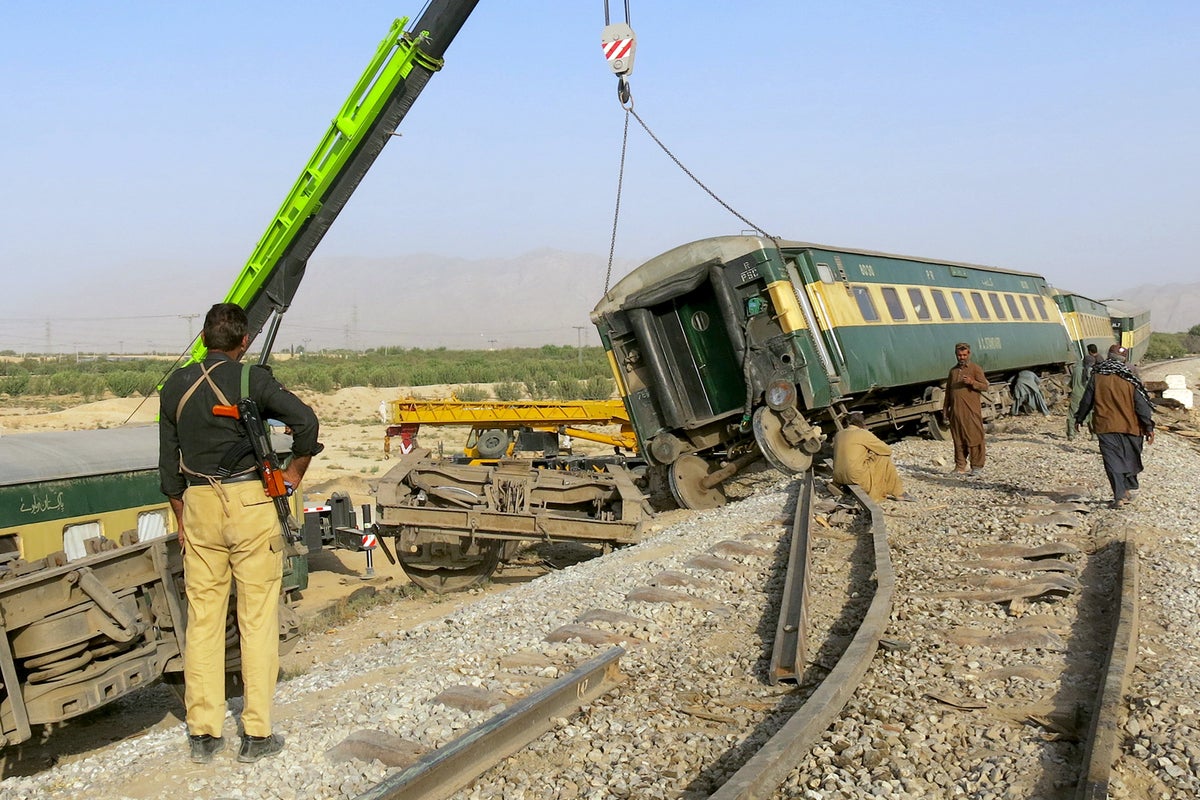The Jaffar Express – which runs for 1,000 miles between Peshawar in Pakistan’s northwest and Quetta in its troubled southwest – is fast becoming the country’s most dangerous train.
In 2025 alone, it has been bombed, hijacked, shot at, and derailed at least seven times, making it a key target of militant violence.
At least seven people were injured on Tuesday when a powerful blast tore through the train, in the latest incident derailing four of its coaches near Sultan Kot railway station in Sindh province.
The explosion, caused by an improvised explosive device (IED), was the seventh attack this year on a passenger train that connects the insurgency-hit province of Balochistan with the rest of Pakistan.

Police said about five pounds of explosives were used in the device, which detonated on the tracks as the Quetta-bound train travelled from Peshawar.
“At least seven people were injured, one of them seriously, when four bogies overturned as a result of a blast near Sultan Kot railway station this morning,” a senior police officer told Arab News. The injured were moved to hospital, where all are now said to be in stable condition.
Sindh’s home minister, Zia-ul-Hassan Lanjar, ordered an immediate investigation. “Terrorists involved in damaging the railway track will soon be brought to justice,” he said, promising a “thorough investigation” to identify the perpetrators.
By evening, the Baloch Republican Guards (BRG), an armed separatist group, claimed responsibility for the bombing.
In a statement, the group said: “The train was attacked at a time when personnel of the occupying Pakistani Army were travelling on board. As a result of the explosion, several soldiers were killed and injured, and six coaches of the train derailed.” The group added that “such operations will continue until the independence of Balochistan”, reported the Firstpost.
The most devastating attack came in March, when militants from the Balochistan Liberation Army (BLA) hijacked the train with around 400 passengers on board in the rugged Bolan mountain range.
The standoff lasted more than 30 hours before security forces stormed the train, killing 33 militants but with 23 soldiers, three railway staff and five passengers losing their lives in the assault.
In August, an IED blast derailed six coaches in Balochistan’s Mastung district, injuring four passengers. Just days earlier, gunmen fired on the train’s pilot engine near Kolpur – an attack claimed by the BLA. Another bomb went off near Sibi railway station that same month, narrowly missing the train.
In June, a remotely detonated explosive derailed four coaches in Jacobabad, Sindh. Such is the frequency of the attacks, a derailment in Sukkur in July was initially suspected to be caused by a blast before officials confirmed it was due to a technical fault.
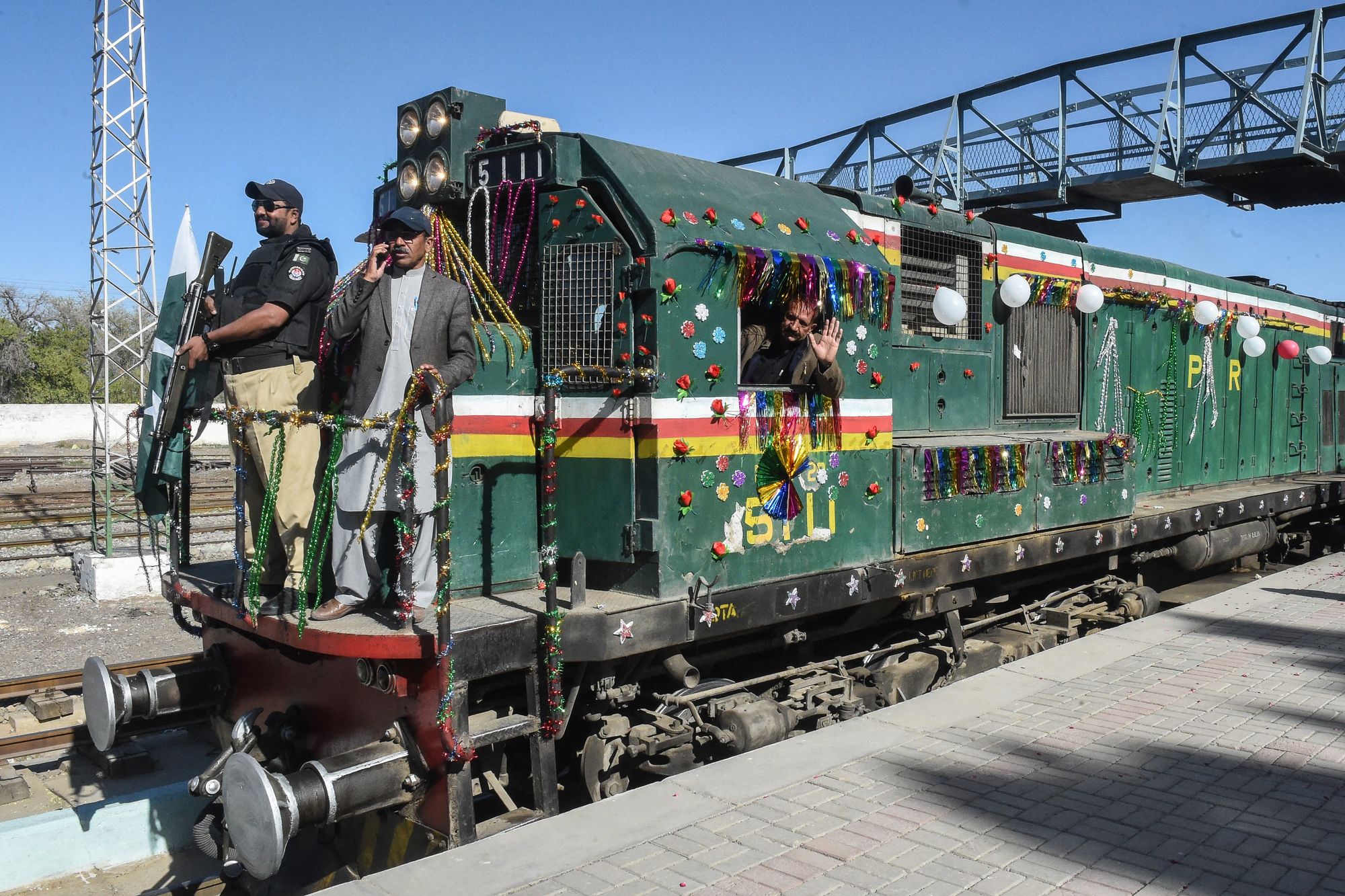
The Jaffar Express is vital for connecting Balochistan with the rest of the country and is often used by soldiers and railway personnel, making it a recurring target for militant groups.
Pakistan’s federal railways minister, Hanif Abbasi, blamed India for the repeated assaults.
“The terrorists targeting Jaffar Express again and again are, in fact, proxies of India that is not ready to digest its defeat during operation Bunyan Al Marsoos,” he told the Dawn, in an apparent reference to Pakistan’s retaliation to its hostile neighbour during the conflict in May.
India and Pakistan were entangled in a military stand-off after the Pahalgam attack in which 26 people were killed. “These cowardly acts cannot stop Pakistan Railways from operating this train.”
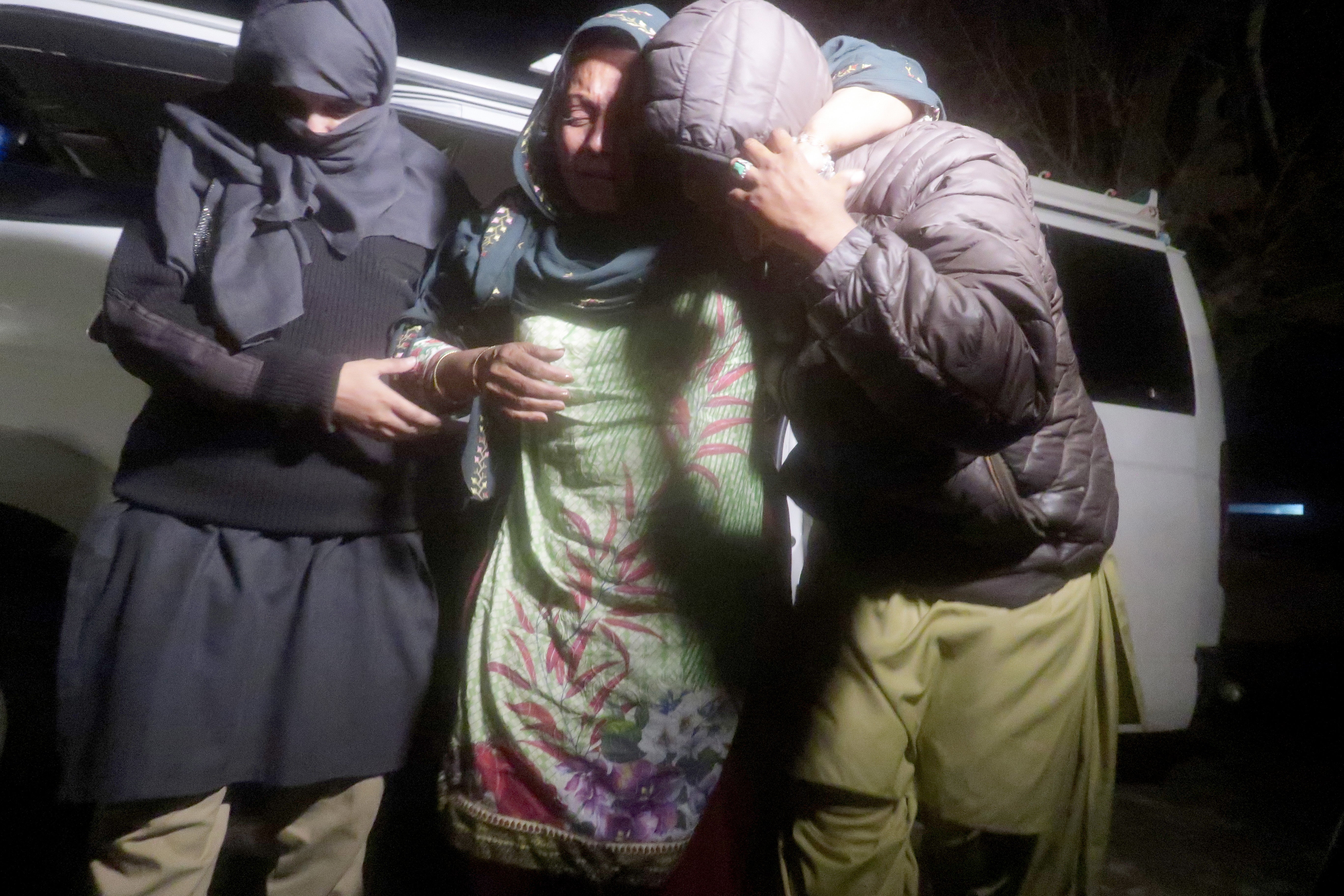
While India has not yet issued a statement on the allegation by Pakistan over the recent attack, in the past it rejected the claim.
Mr Abbasi praised the “brave drivers, guards and other crew members” who continued to work on the service despite the repeated attacks, adding: “I also salute our passengers who continue to travel on this train, giving a message to cowardly terrorists that Pakistanis are a brave nation that will never surrender.”
Sindh’s chief minister, Murad Ali Shah, condemned the attack and asked for an immediate report from the police. He directed that “the best possible medical assistance” be provided to the wounded passengers, reported the Dawn.
The Jaffar Express runs through Pakistan’s most volatile corridor. The province of Balochistan, which borders Iran and Afghanistan, has been the centre of a long-running insurgency led by armed separatist groups such as the Balochistan Liberation Army, the Baloch Republican Guards, and the Baloch Liberation Front.
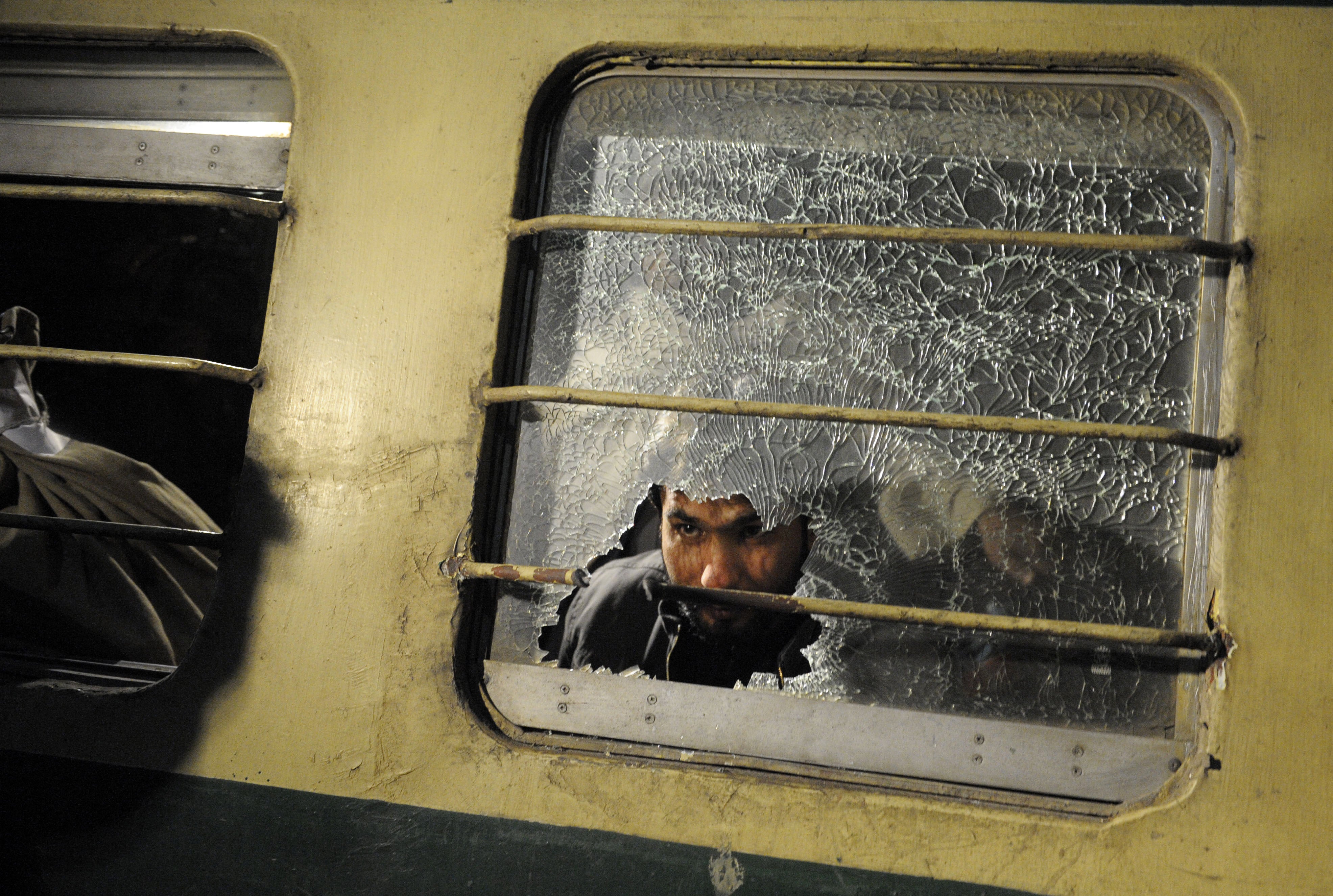
These groups claim to be fighting for independence from Pakistan, accusing Islamabad of exploiting Balochistan’s natural gas, mineral and coastal resources while leaving its 15 million residents impoverished.
The province remains essential to trade and housing the Chinese-backed Gwadar deep-sea port – a key node in Beijing’s Belt and Road Initiative linking western China to the Arabian Sea.
For Baloch insurgents, the Jaffar Express symbolises the state’s presence and reach in the region. Security personnel, government officials and traders frequently use the train to travel between Quetta and other cities, making it an appealing target.
According to Al Jazeera, the BLA – one of the largest and most active separatist groups – has expanded its attacks from gas pipelines and security convoys in December 2023, to public infrastructure, in an apparent attempt to disrupt Pakistan’s economic and strategic connectivity projects.
The group, also known as the Majeed Brigade, was designated a foreign terrorist organisation by the United States in August this year, tightening restrictions on any financial or material support for its operations.
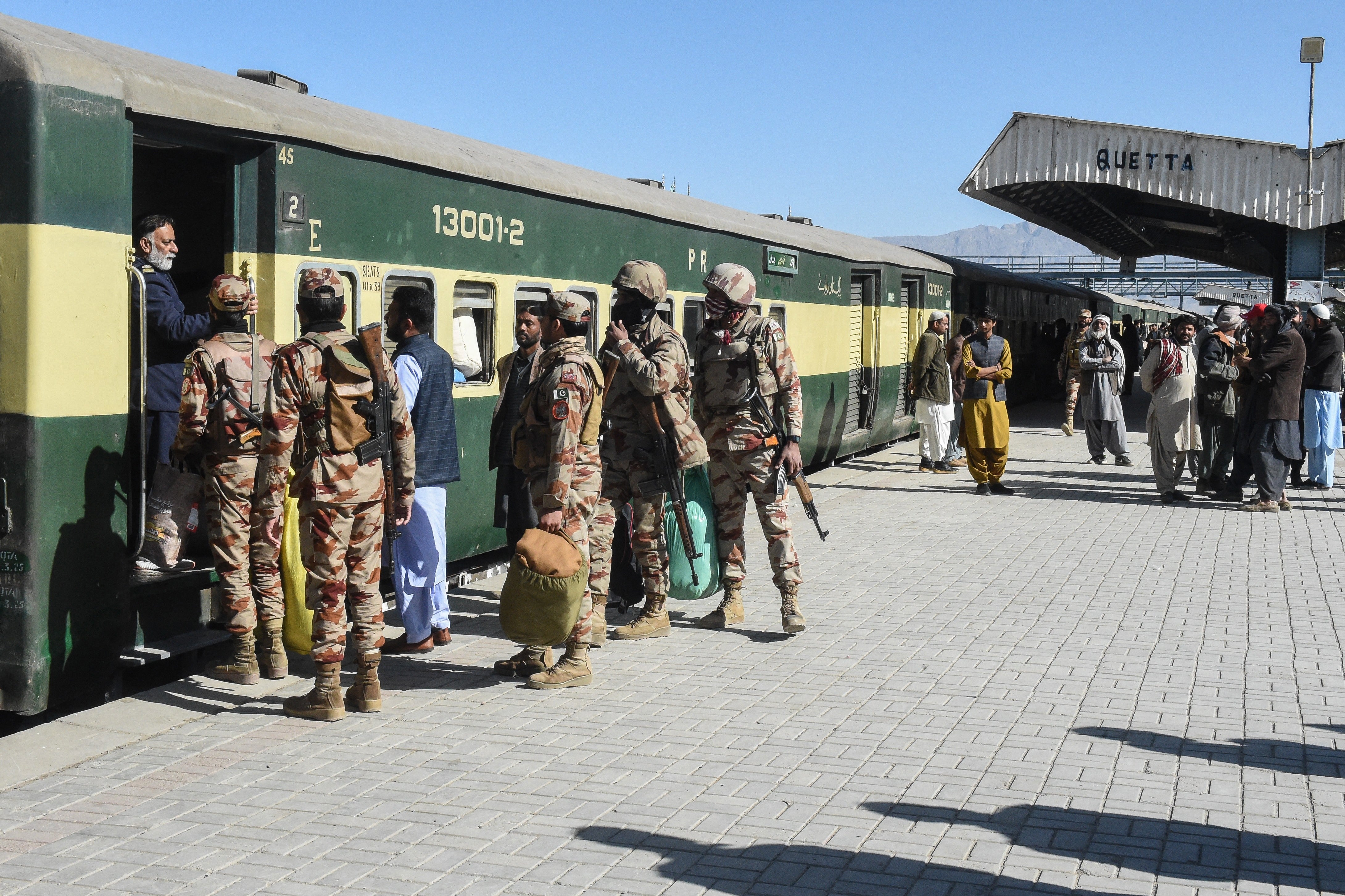
The Baloch Republican Guards, which claimed Tuesday’s attack, is part of a loose alliance of insurgent outfits known as the Baloch Raaji Aajohi Sangar.
It was formed in 2012, following the killing of a Baloch leader’s family members and has since carried out dozens of bombings across Sindh and Balochistan, including an attack on a natural gas pipeline in 2023 in Rahim Yar Khan district that disrupted supply to parts of Punjab.
Human rights activists accuse the Pakistani Army of widespread abuses in the province, including extrajudicial killings and enforced disappearances of young men suspected of sympathising with separatists.
Earlier in April this year, UN’s office of High commissioner urged Pakistan to address human rights violation in Balochistan.

Expressing serious concerns over “the excessive and harmful impacts of Pakistan’s counter-terrorism measures in Balochistan,” the UN human rights experts “called for full respect for international law”.
“We acknowledge the serious threat posed by armed groups in Balochistan and express our solidarity with the victims of terrorism,” the experts said. “All measures to counter terrorism must always respect international human rights and humanitarian law.”
The Pakistan government denies claims of human rights abuse and enforced disappearances, insisting that many of the missing have joined separatist groups or fled the country.
The insurgency has erupted in waves since Pakistan’s creation in 1947, with the latest uprising beginning in the early 2000s. While early movements sought greater autonomy and resource control, the modern Baloch struggle increasingly demands full independence.
Despite the repeated assaults, Pakistan Railways insists the Jaffar Express will keep operating. “We will never be afraid of such attacks,” Mr Abbasi told the Dawn, adding that the security to the train routes would be tightened. “The train will continue as per routine.”


